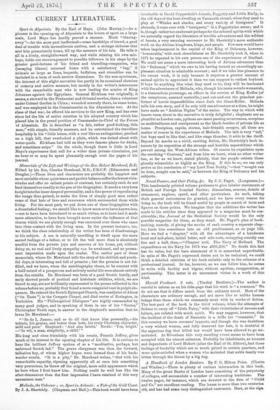Memorials of the Life and Writings of the Rev. Robert
Morehead, D.D Edited by his Son, Charles Morehead, M.D., F.R.C.P. (Edmonston and Douglas.)—Those lives and characters are probably the happiest and most enviable whose quiet tenor and perfect balance suffer the fewest vicis- situdes and offer no salient points of contrast, but certainly such do not lend themselves readily to the pen of the biographer. It needs a very keen insight into the inner deeps of personality, and a fine power of reproducing the image thus gained, to make the lives of simply good men reflect some of that halo of love and reverence which surrounded them while living. For the most part, we put down one of these biographies with a dissatisfied feeling ; we should like to know more or to have known less, —not to have been introduced to so much virtue, or to have had it made more attractive, to have been brought more under the influence of that charm which we see plainly enough was exercised over those who came into close contact with the living man. In the present instance, too, we think the close relationship of the writer has been of disadvantage to his subject. A son is naturally unwilling to dwell upon the more sacred feelings of a father, or to lift the veil more than is absolutely needful from the private joys and sorrows of his home, yet, without doing so, no real and lively sympathy can bo awakened, and no perma- nent impression made upon the reader. The earlier part of these memorials, where Dr. Morehead tells the story of his childish and youth- ful days, is interesting and fall of promise ; but the promise is not ful- filled, acid we have, when the autobiography closes, to be content with a bald record of a prosperous and actively useful life seen almost entirely from the outside. Dr. Morehead was born of a good Scotch family, and early showed proofs of poetical and histrionic abilities, which, we are forced to say, are not brilliantly represented in the poems collected in the volume before us; probably they found a more congenial vent in pulpit elo- quence. He entered the Scotch Episcopal Church, was coadjutor of Alison (" On Taste ") in the Cowgate Chapel, and died rector of Easington, in Yorkshire. His "Philosophical Dialogues" are highly commended by many good judges, and in speaking of them in one of his "Noctes,' Christopher North says, in answer to the shepherd's assertion that he loves Dr. Morehead :-
" ' So do I, James ; and so do all that know bim personally,—his talents, his genius, and better than both, his truly Christian character, mild and pure.' Shepherd : And also bricht.' North : ' Yes, bright.' —‘ In wit, a man, simplicity, a child.' "
His long and close friendship with his cousin, Francis Jeffrey, gives much of its interest to the opening chapter of his life. It is curious to hear the brilliant Jeffrey spoken of as a " meditative, perhaps, but unformed Scotch lad." The grave clergyman was then the forward, talkative boy, of whom higher hopes were formed than of his back- warder cousin. "It is a pity," Dr. Morehead writes, "that with his remarkable capacity, ripening apparently all at once into something very precocious, he threw off the original, more solid appearance which he bore when I first knew him. Nothing could be well less like his after-demeanour than the first impression I have retained of this very uncommon man."






























 Previous page
Previous page